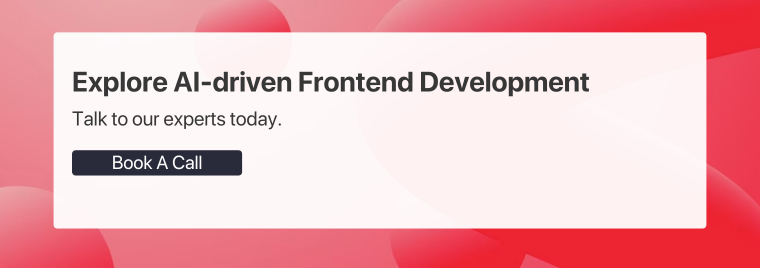Table of Contents
Make AI Generate Components for You
Author

Date

Book a call
In his presentation, Vedant showcases the capabilities of AI-driven development tools, particularly in the context of frontend engineering. Let's dive into the key takeaways and insights from this live demonstration.
Introduction to CodeParrot
Vedant, an engineering manager with extensive startup experience, introduced CodeParrot—a tool aimed at helping developers accelerate their coding process.—a tool aimed at helping developers accelerate their coding process. The motivation behind CodeParrot stemmed from a desire to streamline frontend development, leveraging AI to assist developers in coding tasks.
Live Demonstration Highlights
The presentation began with an interactive demonstration involving the audience, primarily composed of frontend developers. The presenter initiated the demonstration by importing a Figma design file into CodeParrot. This step was crucial as it established the design specifications for the component that needed to be coded.
Leveraging AI for Component Creation
Using CodeParrot, Vedant demonstrated how AI could interpret a design file and generate code components. The AI model, akin to a conversation with GPT-3.5, prompted the developer for specific details and preferences regarding the code it was generating.
The audience witnessed the AI model's capability to comprehend design elements and translate them into functional code snippets. By asking the right questions and providing input, developers could guide CodeParrot to produce tailored code that aligned with their project requirements.
Tailoring Code Generation
During the demonstration, the presenter highlighted the flexibility of CodeParrot. By selecting parameters such as Tailwind CSS and React, the AI model tailored its output to match the desired coding environment and standards. This dynamic adaptation showcased CodeParrot's adaptability to different frontend frameworks and libraries, enhancing its utility for a wide range of projects.
Challenges and Learning Points
The talk also showcased the challenges associated with AI-driven development tools. Despite its efficiency, the generated code sometimes required manual adjustments to align perfectly with the design specifications. This highlighted the need for developers to review and refine AI-generated code to ensure it met project standards and design fidelity.
Importance of Prompt Engineering
Vedant next emphasized the significance of prompt engineering—structuring inputs for AI models to optimize performance. By providing well-crafted prompts, developers can guide the AI to produce more accurate and relevant code snippets. This approach underscored the collaborative nature of AI-assisted development, where human expertise and machine intelligence complement each other.
Future Enhancements and Use Cases
In response to audience questions, the presenter, Vedant, discussed potential enhancements for CodeParrot, such as integrating custom design libraries and accommodating diverse coding styles beyond Tailwind CSS. This forward-looking approach highlighted CodeParrot's potential for evolving alongside frontend development practices, catering to the unique needs of developers and organizations.
Conclusion: AI as a Productivity Tool
The presentation underscored AI's role as a productivity tool in modern software development. While AI-driven tools like CodeParrot can significantly expedite frontend coding tasks, they also necessitate a nuanced understanding from developers to achieve optimal results. By harnessing AI's capabilities judiciously, developers can enhance their efficiency and focus on higher-level aspects of software development.
To summarize, the demonstration provided valuable insights into the practical application of AI in frontend development, illustrating both the capabilities and nuances of integrating AI-driven tools into the developer workflow. The audience gained firsthand experience of how AI can streamline component creation and empower developers to work more efficiently in frontend projects.
Check out the entire talk below ⬇️
Related Articles
Dive deep into our research and insights. In our articles and blogs, we explore topics on design, how it relates to development, and impact of various trends to businesses.






